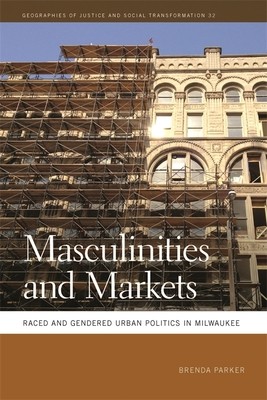
- We will send in 10–14 business days.
- Author: Brenda Parker
- Publisher: University of Georgia Press
- ISBN-10: 082035032X
- ISBN-13: 9780820350325
- Format: 15.2 x 22.9 x 1.6 cm, softcover
- Language: English
- SAVE -10% with code: EXTRA
Reviews
Description
Studies of urban neoliberalism have been surprisingly inattentive to gender. Brenda Parker begins to remedy this by looking at the effect of new urbanism, "creative class," and welfare reform discourses on women in Milwaukee, a traditionally progressive city with a strong history of political organizing. Through a feminist partial political economy of place (FPEP) approach, Parker conducts an intersectional analysis of urban politics that simultaneously pays attention to a number of power relations. She argues that in the 1990s and 2000s, the city's business-friendly agenda--although couched in uplifting rhetoric--strengthened existing hierarchies not only in class and race but also in gender.
Taking on municipal elites' adoption of Richard Florida's "creative class" thesis, for example, Parker looks at the group Young Professionals of Milwaukee, exposing the way that a "creative careers" focus advances fundamentally masculine values and interests. She concludes with a case study that shows how gender and race mattered in the design, enactment, and contestation of an uneven urban redevelopment project. At once a case study of the city and a theorization of urban neoliberalism, Masculinities and Markets highlights how urban politics and discourses in U.S. cities have changed over the years.EXTRA 10 % discount with code: EXTRA
The promotion ends in 15d.19:36:42
The discount code is valid when purchasing from 10 €. Discounts do not stack.
- Author: Brenda Parker
- Publisher: University of Georgia Press
- ISBN-10: 082035032X
- ISBN-13: 9780820350325
- Format: 15.2 x 22.9 x 1.6 cm, softcover
- Language: English English
Studies of urban neoliberalism have been surprisingly inattentive to gender. Brenda Parker begins to remedy this by looking at the effect of new urbanism, "creative class," and welfare reform discourses on women in Milwaukee, a traditionally progressive city with a strong history of political organizing. Through a feminist partial political economy of place (FPEP) approach, Parker conducts an intersectional analysis of urban politics that simultaneously pays attention to a number of power relations. She argues that in the 1990s and 2000s, the city's business-friendly agenda--although couched in uplifting rhetoric--strengthened existing hierarchies not only in class and race but also in gender.
Taking on municipal elites' adoption of Richard Florida's "creative class" thesis, for example, Parker looks at the group Young Professionals of Milwaukee, exposing the way that a "creative careers" focus advances fundamentally masculine values and interests. She concludes with a case study that shows how gender and race mattered in the design, enactment, and contestation of an uneven urban redevelopment project. At once a case study of the city and a theorization of urban neoliberalism, Masculinities and Markets highlights how urban politics and discourses in U.S. cities have changed over the years.

Reviews